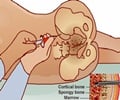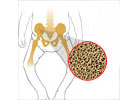Antibody-studded iron nanoparticles were infused into the bloodstream to treat heart attack damage by researchers at the Cedars-Sinai Heart Institute.

The study, which focused on laboratory rats, was published today in the online peer reviewed journal Nature Communications. The study addresses a central challenge in stem cell therapeutics: how to achieve targeted interactions between stem cells and injured cells.
Although stem cells can be a potent weapon in the fight against certain diseases, simply infusing a patient with stem cells is no guarantee the stem cells will be able to travel to the injured area and work collaboratively with the cells already there.
"Infusing stem cells into arteries in order to regenerate injured heart muscle can be inefficient," said Eduardo Marbán, MD, PhD, director of the Cedars-Sinai Heart Institute, who led the research team. "Because the heart is continuously pumping, the stem cells can be pushed out of the heart chamber before they even get a chance to begin to heal the injury."
In an attempt to target healing stem cells to the site of the injury, researchers coated iron nanoparticles with two kinds of antibodies, proteins that recognize and bind specifically to stem cells and to injured cells in the body. After the nanoparticles were infused into the bloodstream, they successfully tracked to the injured area and initiated healing.
"The result is a kind of molecular matchmaking," Marbán said. "Through magnetic resonance imaging, we were able to see the iron-tagged cells traveling to the site of injury where the healing could begin. Furthermore, targeting was enhanced even further by placing a magnet above the injured heart."
Advertisement
Earlier this year, Heart Institute researchers began a new study, called ALLSTAR, in which heart attack patients are being infused with allogeneic stem cells, which are derived from donor-quality hearts. The process to grow cardiac-derived stem cells was developed by Dr. Marbán when he was on the faculty of Johns Hopkins University. Johns Hopkins has filed for a patent on that intellectual property and has licensed it to Capricor, a company in which Cedars-Sinai and Dr. Marbán have a financial interest. Capricor is providing funds for the ALLSTAR clinical trial at Cedars-Sinai. Recently, the Heart Institute opened the nation's first Regenerative Medicine Clinic, designed to match heart and vascular disease patients with appropriate stem cell clinical trials being conducted at Cedars-Sinai and other institutions.
Advertisement
Source-Eurekalert














